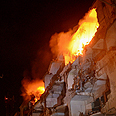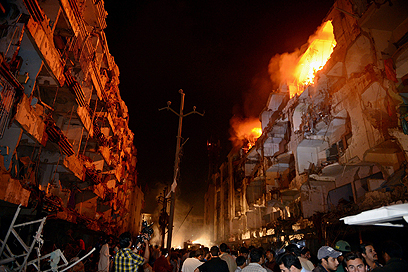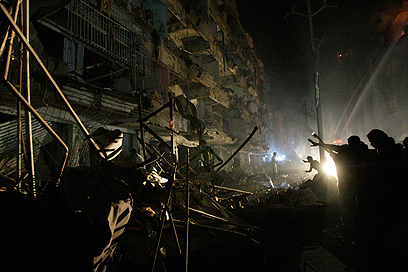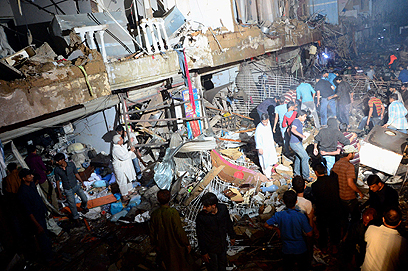
Bomb at Shiite mosque kills 45 in Pakistan
Suicide bomber targets Karachi mosque killing and wounding dozens as sectarian conflict with Sunnis escalates
"It's like doomsday to me. I was watching television when I heard an explosion and my flat was badly shaken," said Mariam Bibi.
Related stories:
- Pakistan: 15 killed in Muslim protests
- Mob in Pakistan kills man accused of burning Koran
- Israeli, Pakistani news agencies launch joint media venture
"I saw people burning to death and crying with pain. I saw children lying in pools of their own blood and women running around shouting for their children and loved ones."

Scene of the attack (Photos: AFP)
Senior city official Hashim Raza said at least 45 people had been killed and 149 wounded in the blast in Pakistan's biggest city.
Military offensives and US drone strikes against the Taliban in Pakistan have reduced the number of suicide attacks on government and military targets over the past year.
But Sunni groups, most prominently the al Qaeda-linked Lashkar-e-Jhangvi (LeJ), have escalated attacks against Shiites, who they believe are non-Muslims.
With a few hundred hard-core cadres, the LeJ aims to trigger sectarian violence that would pave the way for a Sunni theocracy in US-allied Pakistan, Pakistan intelligence officials say.

Dozens wounded
Its immediate goal, they say, is to stoke the intense Sunni-Shi'ite violence that has pushed countries like Iraq close to civil war.
Bombings targeting Shiites have killed nearly 200 people in Quetta alone since the start of the year, and residents of the city say they are under siege by LeJ death squads who seem to act with impunity.

Sectarian conflict escelating
The bloodshed has prompted human rights group to accuse the Pakistani government, which receives billions of dollars in American aid, of turning a blind eye to the bombings.
While the military have launched major offensives against Taliban fighters they have not taken similar action against Sunni sectarian groups.
In 2012, sectarian attacks and clashes climbed by 47% to 208, according to the Pak Institute for Peace Studies, a prominent Pakistani think tank.
- Receive Ynetnews updates directly to your desktop










